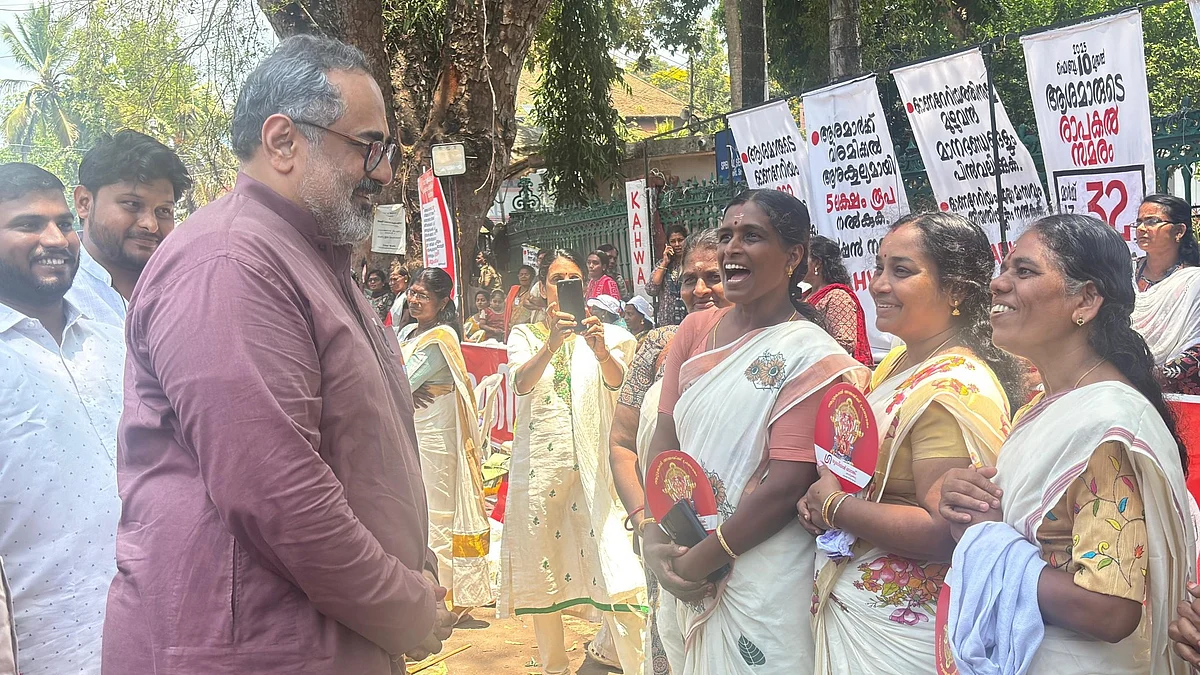Nation
Kerala ASHA workers combine Attukal Pongala festivities with ongoing protest
For over a month now, the ASHAs have been campaigning for fair pay, retirement benefits and official recognition of their work

On the 32nd day of their ongoing indefinite strike demanding a minimum income to sustain their livelihoods, hundreds of Kerala's Accredited Social Health Activists (ASHAs) took to the streets during the iconic Attukal Pongala festival on 13 March, Thursday, to highlight their struggles.
Each year, thousands of women devotees from across the state and even neighbouring Tamil Nadu converge on Thiruvananthapuram to participate in the Attukal Pongala, a religious ritual where they offer a sweet dish made from rice, jaggery and other ingredients to the goddess at the Attukal Bhagavathy Temple.
The Kerala Asha Health Workers Association (KAHWA) had not anticipated the strike would last this long, but with the strike entering its fifth week, the ASHAs have now announced plans to lay siege to the state government secretariat on 18 March. Both the Congress and Bharatiya Janata Party (BJP) have expressed support for the protest, while ASHAs affiliated with the Communist Party of India (Marxist)-affiliated union CITU have distanced themselves from the strike.
For weeks now, ASHAs in Kerala have been campaigning for fair pay, retirement benefits and official recognition of their work.
ASHAs are at the heart of India's primary healthcare system, acting as the crucial link in delivering health services and ensuring the reach of government health schemes to the most remote corners of the country.
Launched in 2005, India’s ASHA programme now employs over a million women across almost every state and union territory, making it the world’s largest community volunteer initiative.
Published: undefined
The protest site has seen significant political activity in recent weeks.
MP Suresh Gopi, for example, braved heavy rain to provide umbrellas to the ASHAs after the police dismantled their temporary shelters. Gopi also accused the Left Democratic Front (LDF) government of misallocating funds intended for ASHAs from the National Health Mission (NHM).
Prominent political figures, including Congress leader V.D. Satheesan, Congress Working Committee member Shashi Tharoor and BJP Kerala president K. Surendran, have all visited the protest site to show their support for the ASHAs.
Meanwhile, the CPI(M) mouthpiece Deshabhimani has warned the ASHAs not to fall victim to political manipulation by anti-left forces, particularly the BJP.
In an editorial published on Pongala Day, the newspaper criticised the BJP-led central government for withholding NHM funds allocated to Kerala, amounting to Rs 636.88 crore, and for paying ASHAs a meagre Rs 2,000 per month while failing to recognise them as workers.
In contrast, the LDF government in Kerala has raised their monthly stipend to Rs 7,000.
The editorial urged the central government to officially classify ASHAs as workers and ensure they are paid a minimum wage, pointing out that many work over eight hours a day and contribute significantly to society.
In recognition of their invaluable contributions, particularly during the Covid-19 pandemic, ASHA workers were honoured with the World Health Organization’s (WHO) Global Health Leaders Award in 2022, one of only six recipients that year. Their role in linking communities with healthcare systems, especially in rural areas, was vital during the pandemic.
Published: undefined
ASHAs are responsible for around 60 essential tasks, including preventive, reproductive, maternal and child healthcare, as well as broader community health initiatives. Despite the significance of their work, they remain largely underappreciated and underpaid.
Originally, their role was intended to only supplement their regular income with 2–3 hours of work per day spread over four days a week. However, the scope of their duties has grown, often resulting in a full working day. Many ASHAs are also tasked with non-healthcare duties, such as conducting surveys and completing documentation, in addition to their regular healthcare responsibilities.
Even now, ASHAs are overworked and underpaid, mostly receiving just Rs 2,000 per month as a fixed incentive for their routine work.
While they are entitled to performance-based incentives for specific health programmes, in some states, their pay is lower than that of manual workers under the Mahatma Gandhi National Rural Employment Guarantee Act (MGNREGA).
They are also denied basic workers' rights, such as access to social security, health insurance or pension benefits, and were excluded from the 2020 Code on Social Security, despite recommendations from the Parliamentary Standing Committee on Labour to include them.
In August 2020, nearly 6 lakh ASHA workers across India went on strike, joining ongoing protests in states such as Madhya Pradesh, Uttar Pradesh, Delhi, Karnataka, Haryana, Punjab, Gujarat, West Bengal, Maharashtra and Kerala.
Their demands included a fixed income of Rs 18,000–21,000, pension funds, insurance, retirement benefits, clearance of pending payments and formal recognition of their contributions to healthcare.
Published: undefined
Follow us on: Facebook, Twitter, Google News, Instagram
Join our official telegram channel (@nationalherald) and stay updated with the latest headlines
Published: undefined